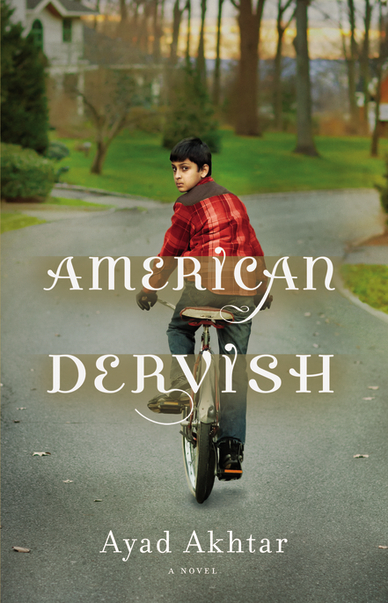American Dervish, by American actor and author Ayad Akhtar, is set in one of the many places in the world with vibrant Muslim communities. In this case: Wisconsin. Akhtar skillfully develops wonderful characters. As I delved into this novel I kept wanting to set aside more time to read so I could find out what would happen to characters like the Pakistani-American protagonist Hayat; Mina, a dear family friend; and Mina’s suitor, the kind Jewish doctor Nathan.
Through these characters, Akhtar powerfully tackles topics that are hot button issues within the Muslim community like the value of memorizing the Qur’an in Arabic, anti-Semitism and domestic abuse.
Qur’an “translation” conundrum
Along the way, American Dervish has one of the most interesting wrestling matches I’ve seen yet over whether or not to make the Qur’an accessible in languages other than Arabic for people who do not speak or read this language. Although a non-Muslim onlooker to these intra-Muslim debates, I myself have sat through more than a few Catholic Masses in Latin trying to figure out why we weren’t using a language the congregation would actually understand. I have read academic paper after academic paper on language and the Qur’an and listened to quarrels about whether renderings of the Quran in other languages should be called “interpretation,” “translation,” or “version.” Yet none of these analytic discourses captured the potential spiritual implications of this question for Muslims the way Akhtar does in American Dervish. He gives the reader a view into this question through the innocent eyes of the little boy Hayat as he emerges into the first inklings of spiritual awareness and begins to encounter his Holy Book.
The Hafiz
Hayat’s father, Naveed, a Muslim immigrant to the U.S. from Pakistan is beyond fed up with those he views as nut-case Muslim fundamentalists. Naveed forbids his son from reading the Qur’an, but when Mina, a friend of Hayat’s mother from Pakistan, comes to stay with their family along with her five-year-old son, she introduces Hayat to his faith. Mina is divorced, single mother, a combination considered toxic in her social circles in Pakistan. She hopes time in America will offer her some respite, and perhaps even a new lease on life, insulated from the social prejudices of home.
The Qur’an serves as the foundation for Mina’s life and in her informal, clandestine tutorials to Hayat, she awakens him to the mystery and wonder of his Holy Book. “[D]on’t just start with memorizing. Read it first. See what it means…Words don’t matter if you don’t know what they mean,” she advises him. Hayat takes it upon himself to spend his recesses reading, practicing and memorizing the Qur’an’s chapters in English. All the while, he continues to hear boastful praise of a cousin three years older than Hayat who has become a “hafiz,” or one who has memorized the Qur’an. Hayat is in awe of and intimidated by this boy, but upon finally meeting him discovers this hafiz is a brat through and through, and quite a crude one at that.
The boy’s father brags, “It cost me a fortune [to have my son tutored]….but it’s worth it. Heaven is worth every penny and a hundred million more.” As if one could buy heaven and as if this excuses this father for not investing in cultivating his son’s character. Meanwhile his cousin’s mouth spews only disdain and profanity: “What a f[***]ing nightmare… Memorizing that stuff.”
The Qur’an for Hayat, on the other hand, is the text from which he has learned about mercy, compassion, kindness, all reinforced by the expression of these values in Mina’s character. These first encounters with the “saintly” hafiz cousin bring fissures of cognitive dissonance into Hayat’s life as he watches cultural prejudice and practice eclipse what he has been learning from the Qur’an. These fissures become canyons in the years that follow.
Raising problems is the start to solving problems
Hayat, a would-be American dervish of sorts, allows himself, for a little while, to be pulled along by cultural and social currents in spite of how counter these currents run to what Mina has taught him; he learns the hard way that the results of this are terrible. Akhtar’s portrayal of Hayat’s internal struggles is quite nuanced, although less deft are Akhtar’s depictions of Hayat’s emergence into adolescence, which are at times just plain jarring, more than seems fitting for this novel. Akhtar successfully conveys that the spiritual confusion Hayat develops is the kind of confusion that can — eventually — be intensely fruitful. It is the confusion that asks hard questions when practice conflicts with the guidance of prophecy. It is the confusion that comes from thinking critically and from seeing the devastating human costs of failing to do so.
The challenges American Dervish holds up to Muslim communities left me more hopeful than sad. A hefty portion of the novel is a powerful challenge to those Muslim communities that are silent about internal problems like domestic violence and anti-Semitism. And this is the brilliance of American Dervish. Akhtar expresses the human consequences of these two issues, as well as issues of faith versus culture, not in statistics but much more powerfully through the medium of a novel, in the lives of individual characters. In his creations of Mina and Nathan, and Hayat too, Akhtar walks the reader into a beautifully crafted dreamland of a budding, genuinely loving relationship, and then through a wasteland of human devastation. Akhtar is yet another Muslim who is silent no more.
Jennifer S. Bryson is Director of the Islam and Civil Society Project at the Witherspoon Institute in Princeton, NJ.




